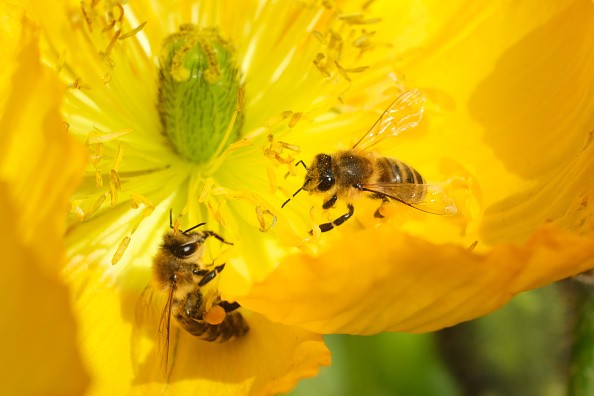The film star and humanitarian speaks about teaching women to take care of bees in UNESCO biosphere reserve..and about the bee that got into her dress.

World Bee Day
It's surprising at first glance to see a beautiful face of an icon and body crowded by bees. When you take a closer look, it tells a deeper story of the exquisite balance between humans and the pollinating insects we rely on for almost all the food we consume.
Angelina Jolie posed for an eye-catching portrait for National Geographic to get attention on World Bee Day to the immediate need to safeguard bees - and to a UNESCO-Guerlain program that coaches women as beekeeper-entrepreneurs and native bee habitats protectors all over the world. An amateur beekeeper, Photographer Dan Winters, got his motivation from a well-known 1981 Richard Avedon Portrait of a hairless California beekeeper, whose bare torso was covered in bees.
Jolie was motivated by various visions: of bees as an essential pillar of our food supply and is under threat from pesticides, parasites, climate change, and habitat loss - and of an international network of women who will be coached to safeguard these useful pollinators.
Bees As Pollinators
She said the actor, humanitarian activist, and director joined her for a meeting in Los Angeles to speak on the connections amid a healthy environment, empowerment of women, and food security, and the 20,000 estimated species of bees, both 4,000 endemic to the United States. Safeguarding life-sustaining pollinators is a challenge well within our grip.
Jolie said: "With so much we are concerned about all over the world and so many people feeling overpowered with bad news, this is one [problem] that we can cope with."
Three out of every four leading food crops for human consumption - and over a third of agricultural land all over the world - rely in part on pollinators, as stated by UN's Food and Agriculture Organization. It's not only vegetables, nuts, and fruits; bees also pollinate alfalfa eaten by cows and crops used in the production of clothing and medicines.

Women for Bees
According to the American Beekeeping Federation, only honeybees enable an estimated $20 billion in crop production in U.S.; pollinators support well more than $200 billion in the production of food globally.
Recently, Jolie was given the name "godmother" for Women for Bees, a five-year program initiated by UNESCO, the UN's scientific, educational, and cultural arm, and the French cosmetics house, Guerlain. Guerlain says it has donated $2 million to coach and assist 50 women beekeeper-entrepreneurs in 25 UNESCO-appointed biosphere reserves all over the world.
According to Guerlain, the women by 2025 are anticipated to build 2,500 native beehives, protecting 125 million bees. This year women from France, China, Cambodia, Bulgaria, Russia, Slovenia, Ethiopia, and Rwanda, will be trained, with others from Indonesia, Peru, and more joining in 2022.
Related Article : Bees' Found Living Deep Under the Ocean
For more news, updates about bees and similar topics don't forget to follow Nature World News!
© 2026 NatureWorldNews.com All rights reserved. Do not reproduce without permission.





